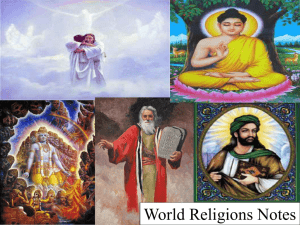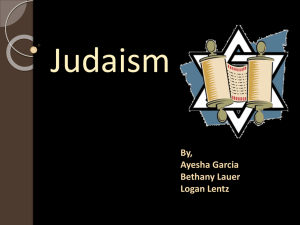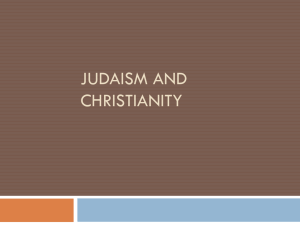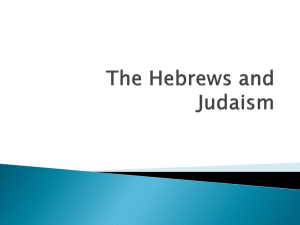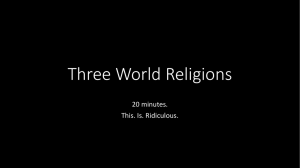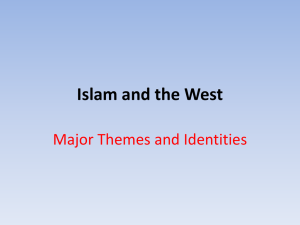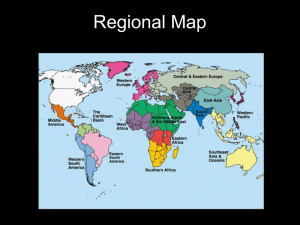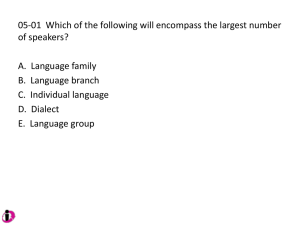All religions
advertisement
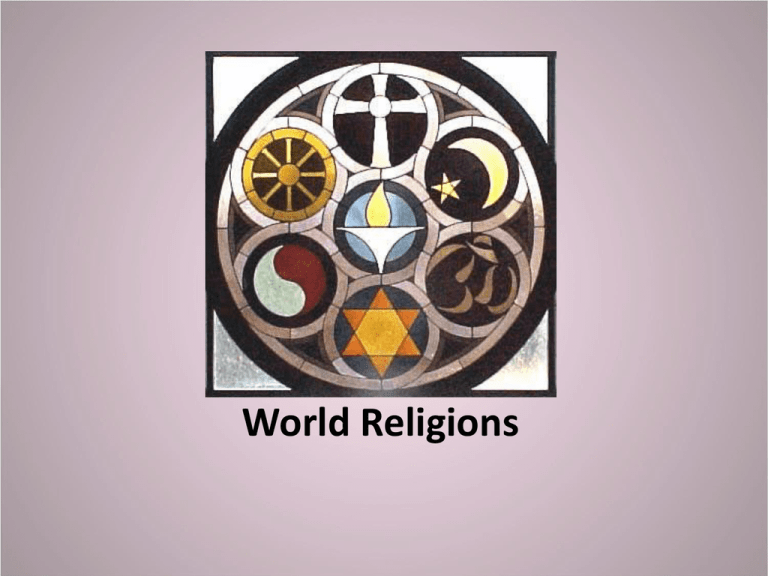
World Religions Essential Questions: • What is the purpose of religion? • What impact does religion have on other aspects of culture? How are we going to study religion? • This is not temple, church, or mosque. Therefore, we will not be analyzing religion as adherents; rather we will be analyzing religion from the outside looking in, as historians. • This does not mean that we will leave out discussion of faith-based beliefs; on the contrary, religious beliefs shaped historical actions and events for thousands of year. Religion and Beliefs Religion is humanity’s way of explaining the unexplainable. God/The gods were and are seen as the provider and sustainer of life. All cultures have a religion of sorts. All religions seek to answer how we got here and what is our purpose Judaism Hear O Israel, the Lord our God, the Lord is One. Judaism • Judaism is the religion of the Jews. • Judaism was the first Western religion: Christianity and Islam grew out of traditional Judaism and share many of the same beliefs. • Judaism was the first monotheistic religion. • People who follow Judaism are known by several names: – – – – Jews (a religious and ethnic connotation) Hebrews (an ancient ethnic connotation) Israelites (ancient national connotation) Israeli (modern national connotation) Jewish Holy Book • The origins and history of the Jewish people is contained an a document called the Torah. • The Torah is NOT one book, but a collection of books that were written between the years 2000 B.C.E. and 400 B.C.E. • Sometimes the Torah is referred to as the Five Books of Moses. Jewish Creation Story • The Jewish creation story described in Genesis is also believed by both Christians and Muslims. • God created the universe in 6 days; and on the seventh God rested. For Jews, the 7th day represents the Sabbath or Shabbat. • God creates the universe out of nothing. • For Jews, Christians, and Muslims, God is the One—perfect unity and pure essence in whom all goodness, justice, and beauty derives. • Judaism began circa 1800 B.C.E. in Mesopotamia (modern day Iraq) with a man named Abraham. • One day, Abraham was called by God to take his family and travel to the land of Canaan, where he would become the father of a great nation. They eventually migrated to Egypt and were enslaved. History General Timeline • 1250B.C.E. Moses led Hebrews from Egypt • According to tradition, he heard the voice of God and made a holy, binding agreement that if the Hebrews would accept God as ruler of Heaven and earth, God would make Hebrews the chosen people • By 1025B.C.E. Kingdom of Israel is formed. • United Israel only had three kings: Saul, David, and Solomon. • David unified Israel, made it a Middle East power • Solomon’s reign was peaceful, built great temple Babylonian Destruction of the Temple The End of United Israel • When Solomon died, his sons disputed who would rule the kingdom. There was a war, which was resolved by the kingdom of Israel being divided into two separate kingdoms: – Judah: Southern Israel encompassing the tribes of Judah (David’s tribe) and the small tribe of Benjamin. – Israel: Northern Israel encompassing the remaining ten tribes. Babylonian Captivity • Solomon died in 931 B.C.E. at which time his kingdom was divided between two of his sons. • Between the years of 700 B.C.E. and 600 B.C.E. both kingdoms were attacked and destroyed by the Babylonians, a strong empire to the east of Israel. • During this time, the temple in Jerusalem was destroyed (580s B.C.E.) and Jews were forced leave their homes in Israel and were resettled in Babylonia. The Second Temple • In 539 B.C.E., the Persian Empire, under King Cyrus the Great conquered the Babylonians and allowed exiled Jews to return to Israel and rebuild their temple in Jerusalem. Persians, Greeks, and Romans (580 B.C.E.-70 C.E.) • Although Jews were allowed to live in Israel and worship their God, they were controlled remotely by foreign empires. • The Persians were the kindest to the Jews, allowing them to practice their culture and religion freely. • Under the Persians, Jews began to speak Aramaic, the common language of the Middle East. Hebrew was only used in religious settings. • In 332 B.C.E. the Greeks, under Alexander the Great conquered the Persian Empire. • From 332-63 B.C.E., Israel was controlled by Greek governors. • Under the Greeks, Israel became very metropolitan and Greek became as widely spoken as Aramaic. Most Jews at this time became trilingual in Greek, Aramaic, and Hebrew. • In 63 B.C.E., the Romans conquered the province of Israel and sent a legion of troops and a governor to keep order in the province. • The Romans ruled as harshly as the Greeks and imposed Roman ways and customs on the Jews, which greatly angered the Jews. New Ideas • There is only one God • God chooses to behave in a way that is both just and fair. • Jews combine two different sounding ideas of God in their beliefs: – God is an all-powerful being who is quite beyond human ability to understand or imagine. – God is right here with us, caring about each individual as a parent does their child. Beliefs • God exists; There is only one God; There are no other gods • God can't be subdivided into different persons • Jews should worship only the one God • God is Transcendent: God is above and beyond all earthly things. • God doesn't have a body, which means that God is neither female nor male. • God created the universe without help • God is omnipresent: God is everywhere, all the time. • God is omnipotent: God can do anything at all. • God is beyond time: God has always existed • God will always exist. • God is just, but God is also merciful God punishes the bad • God rewards the good • God is forgiving towards those who mess things up. • God is personal and accessible. Important Holidays • Rosh Hashanah- Jewish New Year • Yom Kippur- Day of Atonement • Hanukkah- celebrates the ending of persecution of Syrian laws ~170 B.C.E. • Passover- celebrates the libration of the children of Israel out of Egypt by Moses Hinduism “If I were asked under what sky the human mind has most deeply pondered over the greatest problems of life, and has found solutions to some of them which well deserve the attention even of those who have studied Plato and Kant- I should point to India. And if I were to ask myself from what literature we who have been nurtured almost exclusively on the thoughts of Greeks and Romans, and of one Semitic race, the Jewish, may draw the corrective which is most wanted in order to make our inner life more perfect, more comprehensive, more universal, in fact more truly human a life, again I should point to India.” Max Müller (19th century Orientalist) Essential Questions • What are the basic tenets of Hinduism? • How is Hinduism similar to and different from Judaism? Background • No founder • Aryans, settlers of northern India ~2500B.C.E. – Social organization of caste – Many Hindu texts written at this time • Interaction with other cultures leads to spread of ideals • No central religious authority different practices developed Beginnings – It has been theorized that Hinduism is a result of cultural diffusion that occurred between Aryan invaders and the native peoples of India sometime around 1500 B.C.E. – “Hindu” is a catch-all term that includes most of the thousands of different religious groups that have evolved in India since 1500 B.C.E. Basic Hindu Beliefs • Salvation is achieved through a spiritual oneness of the soul with the ultimate reality of the universe, Brahman, by breaking the cycle of reincarnation by doing good deeds and fulfilling one's duty in life • All things have souls so all life is sacred. • Cycle of death and rebirth continues until moksha (release from the cycle) is achieved. • Patriarchal • Usually non violent to avoid bad or negative karma that will prevent you from growing closer to moksha. • Polytheistic? Monotheistic? Something else? Dieties • Brahman: Creator of Life • Gods and goddesses are manifestation of Brahman: – Brahma, the Creator – Vishnu, the Preserver – Shiva, the Destroyer • The three are known as Trimurti, the three deities who represent absolute reality Brahma Vishnu Shiva Significant Writings • Vedas: literature of religious professionals –Upanishads: mystical writings • Agamas: literature of the people –Ramayana and Mahabharata: epic poems –Bhagavad Gita: considered the epitome of the religion Analysis and Discussion • The Mahabharata: Hindu Epic of Awe and Wonder Caste System • The Caste System is a rigid class structure • Dharma and Karma: If you lead a good life, you will be rewarded by being reincarnated as a person belonging to the next highest level in the Caste System. • However, if you are wicked, you will be demoted, and possibly even removed from the Caste System altogether. • Outcasts, or Untouchables, are members of Hindu society thought to have been removed from the Caste System, with no hope of returning to it, due to their misdeeds in previous lives. Work that is deemed unclean for all other Hindus is reserved for these Outcasts. National Geographic, June 2003 • A person who followed the rules of their caste (dharma) would be reborn to a higher form in the next life. A Hindu who neglected their duties would be reborn in a lower form, perhaps as an animal or insect. The goal of Hinduism is to escape the cycle of rebirth by reaching moksha. Buddhism Buddhism begins with a man. In his later years, when India was afire with his message, people came to him asking what he was. Not “Who are you?” but “What are you?” “Are you a god?” they asked. “No.” “An angel?” “No.” “A saint?” “No.” “Then what are you?” Buddha answered, “I am awake.” Essential Questions • What are the basic tenets of Buddhism? • What are similarities and differences between Buddhism, Hinduism, and Judaism? Beginnings • Founder-Siddartha Gautama, or Buddha, which means "enlightened one.” • In 6th c. B.C.E., Brahmin caste was very powerful. Reformers tried to limit their power. • Gautama was a prince who had a luxurious life. • Seers predicted he would be a great ruler OR a world redeemer father wanted the former • Very shielded from unpleasantness of life • Married a princess at age 16; had a son • In time he witnessed an old man, a man suffering with disease, and a corpse outside of his palace. • He left his wife and son and wandered for years until he achieved Enlightenment. • The Buddha said that it didn’t matter what a person’s status in the world was, their gender, or what their background or wealth or nationality might be. All were capable of enlightenment, and all were welcome. • This was radically different from what society was like. • Upon reflection, Gautama deduced that desire was the root cause of all suffering. This idea has been recorded as the Four Noble Truths. Four Noble Truths 1.Life is full of pain and suffering; suffering is universal 2.Human desire causes this suffering. 3.By putting an end to desire, humans can end suffering 4.Humans can end desire by following the Eightfold Path The Three Fires: Greed and desire rooster Ignorance or delusion pig Hatred and destructive urges snake Impact of Buddhism • Geographic Origin-Developed in India and spread through Asia and especially Southeast Asia. • Today- Most common in Southeast Asia and Japan. • Significant Writings-Tripitka, or Three Baskets of Wisdom. Main Sects of Buddhism • Theravada Buddhism – Stresses the monastic life – Respects Buddha as teacher, but not a god – Spread to Southeast Asia • Mahayana Buddhism – Worships Buddha as a god – Spread to China, Tibet, Japan, Korea Tenets • Buddhism is more of a guide on how to morally and ethically live one’s life away from suffering. Many become monks or nuns, living an ascetic lifestyle. • There is no belief in a personal God. It is not centered on the relationship between humanity and God • Buddhists believe that nothing is fixed or permanent - change is always possible • Buddhists can worship both at home or at a temple Buddha preached a religion… • • • • • Devoid of authority Devoid of ritual Devoid of tradition Devoid of the supernatural Of intense self-effort Christianity “For God so loved the world, that He gave His only begotten Son…” Essential Questions • What are the basic tenets of Christianity? • How is Christianity similar to and different from Judaism, Hinduism, and Buddhism? General Information • Founder-Jesus of Nazareth and his disciples who helped spread his teachings. • Geographic Origin-Developed in Judea (now Israel), around the year 30 C.E., under control of Roman Empire • Monotheistic • Significant Writings-The Holy Bible, consisting of both the Old Testament and the New Testament. Roman Reaction to Jesus • Jesus stated publicly that he spoke with the authority of God. • This claim angered the Jewish religious authorities in Palestine, and they handed Jesus over to the Roman authorities as a revolutionary. • He was tried for heresy, condemned, and put to death by means of crucifixion. Who were the Christians? • Jews who believed Jesus was the messiah promised in the Torah • Followed Jesus’ teachings Activity • Continent partner work on Gospel According to Luke Early Christianity – One supreme God who loved humankind – Acceptance • Offers hope and eternal life • Paul moves Christianity away from Judaism • Persecuted for centuries – Strong organization and following by 400 C.E. – Roman Emperor Constantine converts to Christianity in 330 C.E. – Exclusive idea of one truth – Jesus of Nazareth • Message of salvation • Disciples spread message • Christians are expected to attend church services regularly, usually on Sundays and holy days such as Christmas and Easter. On these occasions Christians take part in sacraments, which are religious practices. The Great Schism • The differences between Eastern (Constantinople) and Western (Rome) Christianity culminated in what has been called the Great Schism, in 1054, when the patriarchs of the Eastern and Western division were unable to resolve their differences. • The split led to the Orthodox church and the Roman Catholic church. • The Orthodox Church does not recognize the authority of the Roman papacy and claims a Christian heritage in direct descent from the Christian church of Christ's believers • There are multiple branches of Christianity with slightly differing doctrines. – Roman Catholic – Orthodox – Protestant • broke from Catholicism • Martin Luther’s 95 Theses in 1517 Beliefs • Christians believe that Jesus was the Messiah promised in the Old Testament. • Christians believe that Jesus Christ is the Son of God. • Christians believe that God sent His Son to earth to save humanity from the consequences of its sins. Beliefs • One of the most important concepts in Christianity is that of Jesus giving his life on the Cross (the Crucifixion) and rising from the dead on the third day (the Resurrection). • Trinity: Christians believe that there is only one God, but that there are three elements to this one God: – God the Father – God the Son – The Holy Spirit Islam There is a means of polishing all things Whereby rust may be removed. That which polishes the heart Is the invocation of Allah. Essential Questions • What are the basic tenets of Islam? • How is Islam similar to and different from Judaism, Hinduism, Buddhism, and Christianity? Background Info • Islam, which when translated from Arabic, means "to submit to the will of Allah," is the youngest of the world's major religions. • Islam comes from the word salam which means “peace” and “surrender” • Worshippers of this monotheistic religion are known as Muslims, which means "one who submits to the will of Allah." • Islam is currently the second most practiced religion in the world. • Founder-Islam was founded by the prophet Mohammed. • Geographic Origin-Developed on the Arabian Peninsula in the year 622 CE, and quickly spread to other regions • Currently Practiced- Islam is most dominant throughout the Middle East (Southwest Asia and Northern Africa) and parts of Southeast Asia • Significant Writings-The teachings of Islam are collected in the Qur'an (Koran) History • Founder: Mohammed, born in Mecca around 570 C.E. to a leading tribe • Both parents died; uncle adopted him and he took up the caravan business • Married Khadija at age 25 • During meditation, was visited by Gabriel, who told him to go out and proclaim God’s word, to tell others of the belief in 1 God • Slow start: 40 followers in first 3 years • 622C.E.: After Khadija’s death, Muhammad had to flee from Mecca; went to Medina. • This flight was instrumental to the founding of the religion of Islam and is known as the Hegira. – Marks beginning of spread of Islam – 622 is the first year of the Muslim calendar • 630C.E.: Muhammad returned to Mecca with an army and took over the city; destroyed images of polytheistic gods • Muhammad died in 632C.E. Beliefs • According to Muslims, God sent a number of prophets to mankind to teach them how to live according to His law. • Story of Creation follows Judaism and Christianity to a point – Ishmael’s descendents become the Muslims – Isaac’s descendents become the Hebrews • Adam, Jesus, Moses, David, and Abraham are respected as prophets of God. Muslims believe that the final prophet was Muhammad. • Muslims believe that Islam has always existed but, for practical purposes, date their religion from the time of the migration of Muhammad. • Rules of Living: Muslims believe that the Koran gives information to live by concerning religion, politics, law, and social life Five Pillars of Islam • Shahadah or Confession of Faith: “There is no God but Allah, and Mohammed is His prophet.“ • Salat or Prayer: Muslims must pray five times a day, facing towards Mecca. • Zakat or Charity: Muslims give alms to the poor, and support the local Mosque by donating a portion of their income. • Saum or Fasting: During the Ramadan, the ninth month of the Muslim calendar, all Muslims must fast during daylight hours, except the very young or sick. • Hajj or Pilgrimage: If possible financially, each Muslim must make a hajj, or holy pilgrimage, to the city of Mecca once a lifetime. Prayer Times (in Lititz on 10/23/12) • Salat al-fajr: dawn, before sunrise (6:10am) • Salat al-zuhr: midday, after the sun passes its highest (12:49pm) • Salat al-'asr: the late part of the afternoon (16:32/4:32pm) • Salat al-maghrib: just after sunset (18:13/6:13pm) • Salat al-'isha: between sunset and midnight (19:29/7:29pm) Basic Articles of Faith • Muslims have 6 main beliefs: – Belief in Allah as the one and only God – Belief in angels – Belief in holy books – Belief in the prophets – Belief in the Day of Judgment – Belief in Predestination (with human choice) Impact of Muslim Civilization • Through conquest and trade, cultures of Greek, Persian, Egyptian, and Arabic blended • Established banking centers and started using lines of credit • Many advances in medicine, algebra, development of an accurate calendar Divisions • Sunni Muslims – Any devote Muslims can be caliph • Shiite Muslims – Only descendents of Muhammad (or brother-inlaw Ali) can be caliph Similarities to Judaism and Christianity • • • • • Belief in one God Descendant from Abraham Live a moral life in accordance to God’s law Follow the holy texts God is immortal, omniscient, and omnipresent Jerusalem • The Holy city is shared between the three: The Temple Mount (site of the destroyed Temple), the site of Jesus’ crucifixion and burial, and the place where Mohammed rose to heaven. • All three religions believe that the last days of the earth and the final coming will occur in Jerusalem.
